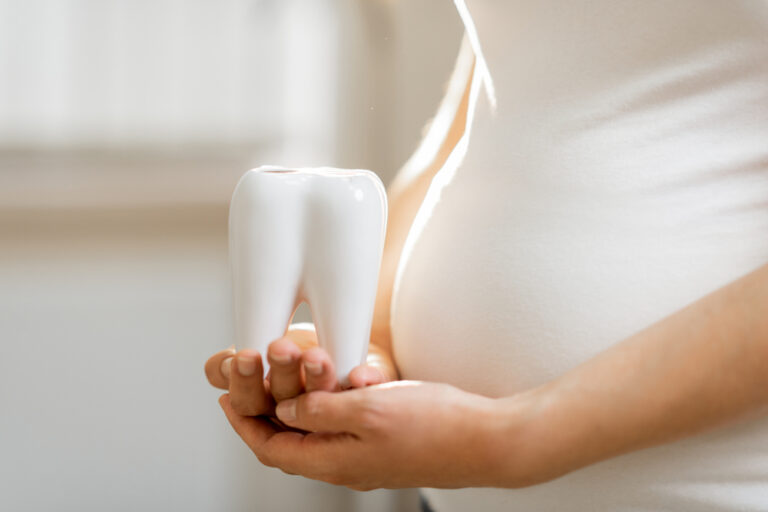Medical Disclaimer: This content is for informational and educational purposes only and does not constitute medical or dental advice, diagnosis, or treatment. Home remedies are not substitutes for professional dental care. Tooth pain during pregnancy may indicate serious conditions requiring immediate professional attention. Always consult your dentist and OB/GYN before using any home remedies, especially during pregnancy. If you experience severe pain, swelling, fever, or signs of infection, seek immediate professional care.
Did you know that during pregnancy, women are more likely to develop gum disease and cavities? It’s believed that it’s the increase in hormones such as progesterone and estrogen that can lead to this. While these hormones are necessary for a healthy pregnancy, they lead to extra blood flow and an overactivation of the mucus membranes, which could trigger gum disease.
An appointment with a dentist may take some time, and pregnant women are limited to the type of pain medication they may use. When you’re experiencing unbearable tooth pain while pregnant, safe home remedies might be your only choice. You also want something that works quickly and supports your overall oral health during pregnancy. Let’s walk through a few safe, simple remedies you can try at home — each designed to help calm discomfort until you can connect with your dentist.
Saltwater Rinse
Salt is a staple in every pantry, and it has remedial qualities. It’s been used for centuries to reduce inflammation and dental bacteria. Modern science explains its qualities this way:
- Osmotic effect: Saltwater has a higher concentration of solutes than fluids, which makes it hypertonic. This quality allows the solution to draw out liquid through osmosis, which helps you reduce swelling and discomfort in inflamed gums.
- Antibacterial action: Saltwater makes the environment in your mouth less hospitable for bacteria to grow in. In this way, it reduces the bacterial load in the mouth and helps prevent infections from worsening.
- Promotes healing: By rinsing with saltwater, you keep the wound area clean. The cleaner the wound, the faster it heals.
- pH balance: A neutral oral pH restores the balance in your mouth. A balanced pH counteracts an acidic environment caused by bacteria.
How to Use It
Mix half a teaspoon of salt with a cup of warm water. Swish around in your mouth for 30 seconds and spit out. Do these two to three times daily.
Why This Is Safe
There’s no ingestion, which means minimal risk. But what if you need more immediate relief from swelling? That’s where cold therapy can help.
Cold Compress or Ice Pack
Cold therapy is known for its direct effect on the body’s pain and inflammation pathways. It can be an effective home remedy when you’re experiencing unbearable tooth pain while pregnant. When you’re waiting to see your dentist and just need to bring down the ache a notch or two, a cold compress helps because:
- Vasoconstriction (narrowing of blood vessels): A cold compress causes the blood vessels to constrict, which reduces the blood flow. When the blood flow decreases, you’ll start feeling relief as the swelling and inflammation decrease.
- Numbing effect: When you bring down the temperature in your mouth, you slow down nerve conduction. This slows down the pain signals to the brain.
- Reduced muscle spasms: Pain can cause the muscles in your face to tense up and spasm, and a cold compress can help alleviate these spasms.
How to Use It
Wrap an ice pack or a cold compress in a soft cloth. Hold it against the inflamed area for 15 to 20 minutes at a time. You can repeat the process as often as needed.
Why This Is Safe
It’s for external use only, and because you’re wrapping it in a soft cloth, there’s no direct contact with the skin or affected area.
Clove or Diluted Clove Oil
You may have heard about using clove oil as a home remedy for tooth pain, which has a lot of anecdotal support. While it doesn’t appear on the University of Texas at El Paso’s list of herbs to avoid during pregnancy, it’s always best to consult a medical professional with regards to your pregnancy. Keep to food amounts, and don’t ingest the pulp or oils. The reason clove can be effective in treating toothache is due to the active compound eugenol, which makes up 70% to 90% of clove oil.
- Analgesic/anesthetic effects: Traditional studies and human use suggest that clove oil is effective as a home remedy when treating unbearable tooth pain while pregnant, as it numbs toothache pain and can act as a local anesthetic.
- Antibacterial/anti-microbial effects: Eugenol is known to reduce the bacterial load, which can be a component of a toothache. In some instances, it educes microbial infection and reduces inflammation.
- Inflammation reduction: Eugenol interferes with the pathways that signal pain and swelling, which suppresses inflammation.
- Speed of relief: Individual response varies. Some people report experiencing relief relatively quickly, though results are not guaranteed and depend on the cause and severity of discomfort.
How to Use It
Apply a very small amount of clove oil on cotton or a cotton swab and hold it on the area. Or, chew on a whole clove close to the painful area. Don’t swallow the clove when you’re done.
Why This Is Safe
Clove is a regular ingredient used in meals. Unless you know of past complications or irritations to it, it should be safe to use. If swallowed, it can cause irritation.
Precautions You Should Consider
As there are no clear or definitive studies on clove oil, you should have a cautious approach to it during your pregnancy.
- Dilute well: Use clove oil only in diluted form, mixing it with a carrier oil such as coconut oil or olive oil. A drop or two diluted is safer than using an undiluted essential oil.
- Limit frequency and duration: Use it only briefly and not daily over extended periods.
- Avoid ingestion: Don’t swallow clove oil or use it in mouthwashes that are swallowed. Topical or local use on the gums or your affected tooth is safer.
- Patch test: Before applying to your gums or skin, test a small amount on less sensitive skin, such as your forearm, to check for a reaction.
- Avoid use during the first trimester if possible: Your baby’s major developmental phase happens in the first trimester. Many guidelines suggest avoiding things that are less well-studied.
- Consult a healthcare provider: Always consult your dentist and OB/GYN before seeking out home remedies for unbearable tooth pain while pregnant. This is especially if there are other complicating factors, including bleeding disorders, medication use, or a high-risk pregnancy.
*Consult your healthcare provider before using clove oil, especially if you’re in your first trimester.
Baking Soda Paste or Rinse
If you’d rather stick with something even gentler, baking soda might be a safe alternative. Bicarbonate of soda is useful during pregnancy, as you can use it to rinse your mouth after a morning sickness spell. It may also come in handy when you have tooth pain:
- Neutralizes acids: Baking soda neutralizes acids caused by dental bacteria. This acid contributes to tooth pain.
- Mild antibacterial action: Baking soda reduces the growth of cavity-causing bacteria such as Streptococcus mutans.
- Reduces inflammation and cleanses: Rinsing and cleaning the mouth removes food particles, which reduces inflammation.
- Whitens and reduces plaque: Baking soda is mildly abrasive and reduces buildup on teeth and the gum line. By removing this, you can reduce gum inflammation and tooth sensitivity.*
Note: While baking soda has mild abrasive properties, this article focuses on its use for temporary pain relief, not cosmetic purposes.
How To Use It
Mix baking soda and a little bit of water to create a paste, and apply it to the affected area. If you want to use it as a mouth rinse, add a teaspoon of baking soda to a glass of water and swish it around for 30 seconds before spitting it out.
Why This Is Safe
Baking soda is non-toxic, non-medicated, a neutralizer, and gentle on the stomach if you accidentally swallow some. Ingesting baking soda in large amounts can result in discomfort. It’s one of the safest home remedies when you’re facing unbearable tooth pain while pregnant.
Herbal Rinses and Teas
Mild herbal teas such as peppermint, chamomile, and sage can bring temporary relief to tooth pain — and they are also pleasant to drink. They carry the following benefits:
- Anti-inflammatory and anti-microbial properties: Herbs like sage, peppermint, and chamomile contain natural compounds that calm inflamed gums and may reduce the bacterial load in the mouth. Chamomile contains apigenin, which has anti-inflammatory effects, and the menthol in peppermint has a soothing quality.
- Warm compress effect: A warm, not hot, teabag applied directly to the affected area can improve circulation, which allows you to relax and experience temporary relief.
- Safe, non-drug option: Certain pain relievers, including ibuprofen, are typically avoided during pregnancy — especially in the third trimester — unless specifically recommended by your healthcare provider. This is why many pregnant women seek alternative methods for temporary relief.
- Hydration and comfort: Drinking safe herbal teas can bring relief and keep you hydrated. Be sure to use these in moderation, and consult reputable pregnancy guides to keep up to date with the latest information.
How To Use It
Brew the tea and drink it as a soothing hot beverage. Or, you can use the warmed teabag as a compress.
Why This Is Safe
While you should avoid strong and unknown herbs, there are safe herbal teas that can reduce your discomfort.
Medical Disclaimer: Mild herbal teas such as chamomile and peppermint are generally considered safe in moderate amounts during pregnancy, though you should consult pregnancy-specific guidelines and your healthcare provider. Avoid consuming large quantities or using concentrated herbal preparations.
Aloe Vera Gel
Aloe vera gel works well on low-grade sunburn and skin irritations, but its hidden soothing property is as a home remedy for toothache and gum pain when you’re pregnant. However, aloe latex can be harmful during pregnancy, so ensure you discuss any options with your healthcare provider before use.
- Anti-inflammatory relief: Compounds found in aloe — acemannan and polysaccharides — calm swollen and irritated tissue. Applying aloe gel can bring soothing relief from irritation and infection to your gums.
- Antibacterial and anti-fungal activity: Aloe has a natural antimicrobial effect that limits the bacteria in your mouth.
- Promotes healing: Aloe vera can promote healing when you experience gum lesions and mouth ulcers.
- Cooling and soothing effects: Aloe vera gel brings immediate comfort to swollen and inflamed oral tissue.
How To Use It
Apply purified aloe vera gel to the affected area. You can use an aloe rinse, too.
Why This Is Safe
Aloe vera is safe as long as you apply it topically and test for possible reactions beforehand.
Medical Disclaimer: Use only pure aloe vera gel intended for oral care, never aloe latex. Do not swallow aloe products during pregnancy. If you experience any irritation, discontinue use immediately.
Precautions and When to See a Professional
Home remedies can offer you relief for mild tooth pain and gum discomfort. But when you experience severe pain, you should consider professional help, as dental issues might affect your pregnancy.
Research has found associations between maternal periodontal disease and certain pregnancy complications, including potential impacts on birth weight. The exact relationship is still being studied, which is why maintaining dental health during pregnancy is important. Instances when you should see a dental professional include:
- Experiencing severe discomfort, swelling, or fever. It might be something small, but it’s important to avoid risking infections during pregnancy.
- Some essential oils may present risks during pregnancy. Do not ingest them, and always confirm use with your healthcare provider.
- Using some herbal products, as some might not work with existing medication or might be unsafe during pregnancy. If you’re unsure, consult your OB/GYN or dentist.
- Taking over-the-counter painkillers unless under the guidance of your OB/GYN or dentist.
Seek immediate professional care if you experience:
- Severe, persistent, or worsening pain
- Swelling of the face, gums, or neck
- Fever or signs of infection
- Difficulty swallowing or breathing
- Bleeding that doesn’t stop
- Pain that prevents eating or sleeping
Dental infections during pregnancy require prompt professional treatment and should never be managed with home remedies alone.
Finding Relief and Protecting Your Pregnancy
It’s 3 AM, and you find yourself rummaging through the medicine cabinet for tooth pain medication. When you’re pregnant and facing a severe toothache, you don’t always have the option to take the first remedy available, and you need to stick to more natural, safe options.
The remedies we’ve shared can bring temporary comfort, but the most important step is knowing when to reach out for professional care. At The Dental Medical Convergence, Inc., we believe protecting your oral health is protecting your whole-body health and your pregnancy outcomes.
If you found these tips helpful, share them with a loved one, and explore more ways to safeguard your health at The Dental Medical Convergence. Together, we can turn pain into prevention.




